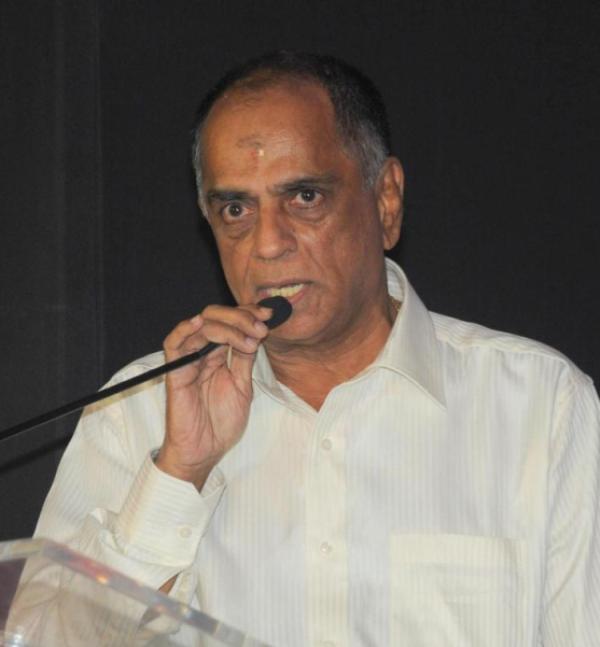
It is 12.30AM at night and I am sleeping. In my sleep I am dreaming about Pahlaj Nihalani. I am actually talking to him. We are having a conversation.
“Sir if you could produce a film with a song khada hai khada hai khada hai, why don’t you like kissing anymore?” I asked him a simple question to start the proceedings.
“You are misquoting the song?”
“Misquoting the song?” I repeated, wondering how does one misquote a song.
“Well you are just singing a part of it,” explained Mr Nihalani, the censor board chief and started humming it himself: “Khada hai khada hai khada hai, dar pe tere aashiq khada hai.”
“This is the complete line?”
“Yes.”
“So?”
“This is a Sufi song. In fact, it was India’s first filmi Sufi song.”
“Sorry?” I asked, wondering what made one of India’s grossest double meaning songs, a Sufi song.
“Let me explain,” continued Nihalani. “The lover is calling out to his beloved and singing that he is standing on her doorstep waiting for her to open the door.”
“Yes?”
“The beloved is essentially a representation of God, you see and the lover is her devotee,” he explained.
“Ah,” I said surprised at this masterful spin that Nihalani had come up with.
“Imagine a Sufi song in Hindi cinema of the 1990s. They used to be full of these double meaning songs. Choli ke peeche/andar kya hai and all that. This was a time when the world hadn’t discovered Nusrat Fateh Ali Khan sab. Or Abida Parveen for that matter. I was ‘so’ ahead of the times.”
“But Sir what about lal duppette waali tera naam to bata?” I asked, trying to get back into the game.
“What about it bacche?”
“Well there is a line in the song where the heroines sing, “har ajnabi ke liye khidki nahi khulti,” and in a very suggestive way slightly raise the hemline of their white mini-skirts. This clearly wasn’t a good projection of Indian culture that you now seem to be so passionate about?”
“Ah, the tragedy of my life,” shouted Nihalani.
“Nobody ever understood the real meaning behind my songs.”
“Real meaning?” I asked.
“Yes. That was a song against pollution. I was telling the people to keep their windows closed till the air gets a little cleaner. Again, I was ahead of the times. Now we at least have Modi Kaka’s Swacch Bharat.”
“And what about main maal gaadi tu dhakka lagga? What was that all about?” I asked, hoping to catch the censor chief off-guard.
“Oh that was a song for the Indian Railways,” he replied.
“Indian Railways?”
“You know that the passenger service of Indian Railways is a loss making operation?”
“So?”
“That was my way of indirectly telling the government that they should be running more freight turns, if they wanted the Railways to be profitable and sustainable.”
“Ah.”
“And look at what happened?” he asked rhetorically.
“What happened?” I repeated.
“Lalu Prasad Yadav stole my idea when he became the Railway Minister in 2004. He gave immense importance to freight operations and revived the Railways,” explained Nihalani. “I never got the respect I deserved until Modi Kaka came along.”
“Hmmm. But what about angna main baba duare pe ma?”
“What about it?”
“The song starts with the heroine Shilpa Shirodkar lifting her ghagra to reveal her thigh. It is followed by the heroine and a string of women extras gyrating their chests and doing other suggestive movements.”
“So?” Nihalani persisted.
“Well if you can produce that sort of a song, what is wrong with James Bond kissing?”
“Well, again you are seeing only what unfolds on the screen.”
“So what is the ‘deeper’ meaning?” I asked, trying to be sarcastic.
“This was a song against obesity.”
“Obesity?” I asked, with my head ready to spin.
“Yes. Look at the dance movements. I have just tried to Indianise aerobic movements. I had given special instructions to the choreographer to do that.”
“Oh.”
“Yes. And this was a time when even Baba’s Yoga was not on the scene,” he explained.
“Yes that is pretty recent,” I said accepting defeat.
“And it was up to me that the country remained healthy until Modi Kaka came along.”
This was when a bucket full of water landed up on me and the girl-friend yelled at the top of her voice, “can you stop shouting Modi Modi even in your sleep.”
(Vivek Kaul is the author of the Easy Money trilogy. He tweets @kaul_vivek. On most days he writes on finance and economics).
This spoof originally appeared on Huffington Post India on Nov 26, 2015